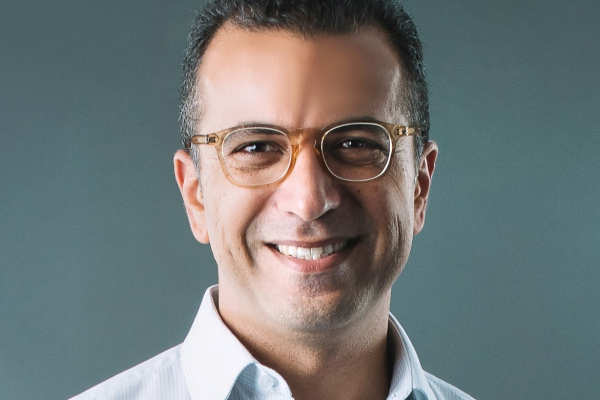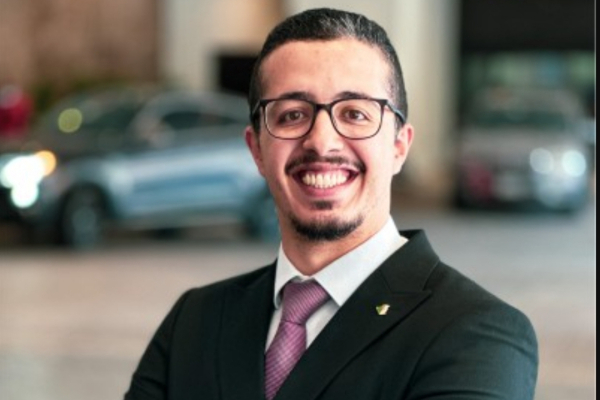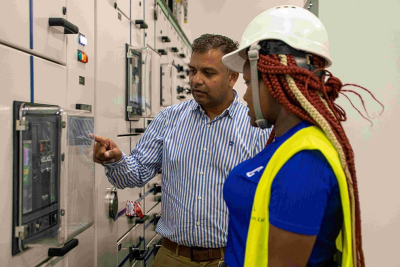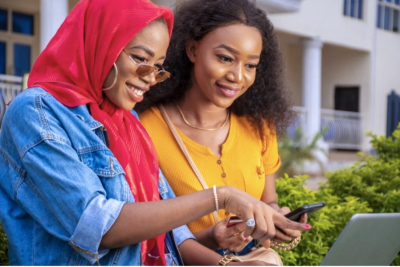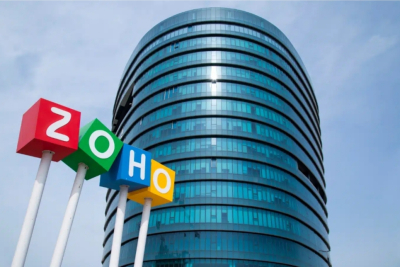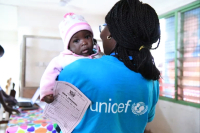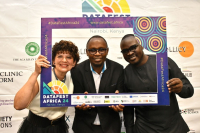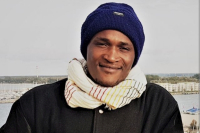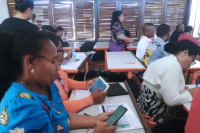As a financial analyst, he leads an innovative company that uses technology to promote financial inclusion in Egypt. His company facilitates access to credit for consumers by working directly with merchants.
Amr Sultan (photo), an Egyptian finance expert and entrepreneur, is the co-founder and CEO of Blnk, a fintech company dedicated to enabling financial inclusion through point-of-sale financing.
Founded in 2021, Blnk specializes in providing consumer credit to underserved populations. The company allows consumers to instantly obtain credit from their favorite merchants and pay in installments over a period of up to 36 months. The credit purchase process through Blnk requires only a national ID card.
Prior to co-founding Blnk, Amr Sultan co-founded Akanar Partners in 2009. As the managing director until 2016, he led this corporate finance and mergers and acquisitions advisory firm, providing services in corporate finance, M&A advisory, fundraising, and structured finance. Akanar Partners was subsequently acquired by Arqaam Capital, an institutional investment bank.
Amr Sultan holds a bachelor's degree in business administration, earned in 1998 from the American University in Cairo. He also became a Chartered Financial Analyst (CFA) in 2001, certified by the CFA Institute.
Sultan began his professional career in 2000 at HC Securities & Investment, an investment bank, as an equity research associate. From 2003 to 2009, he served as co-head of investment banking at Beltone Financial, a financial services provider.
Melchior Koba
His mission is to empower the next generation by equipping them with the technological skills they need to thrive in the modern world. He accomplishes this by designing educational programs for schools, ensuring children receive this training in an innovative and impactful way.
Yaakoub Benarab (photo) is an Algerian tech entrepreneur and the founder and CEO of Snai3i, a company dedicated to transforming education in the Middle East and North Africa (MENA) region.
Founded in 2019, Snai3i develops educational programs aimed at simplifying advanced technologies for children. The company offers schools courses in mobile programming, artificial intelligence, Python, 3D modeling, and mechatronics, all tailored specifically for young learners. It provides schools with immediately usable programs and trains teachers in effective pedagogical methods and course design. Additionally, the platform enables experts to create and publish their own courses. To date, the startup has successfully trained 872 students.
Beyond his role at Snai3i, Benarab serves as an information technology instructor at the Higher Institute of Sciences (HIS), a multidisciplinary private university in Algeria recognized by the Ministry of Higher Education and Scientific Research. He is also an ambassador for One Young World, a global community of young leaders.
Benarab graduated from the National Polytechnic School in 2019 with a master's degree in control systems. He also holds a master's degree in learning design and technologies from Arizona State University, which he obtained in May 2024.
In June 2019, he represented The European Wergeland Centre, a European research organization focused on education for intercultural understanding, human rights, and democratic citizenship. By October 2019, he had taken on the role of director at KnowLab, a coworking space. In 2020, he worked as a technology and innovation specialist at the Africa Crisis Hub, which provides public health advisory services.
Melchior Koba
Improving digital infrastructure in Africa provides robust and reliable cloud services that meet international standards. This enhancement is crucial for the region's digital economy, promoting better internet connectivity and data management.
Schneider Electric and IXAfrica Data Centres have launched East Africa’s largest hyper cloud data centre, NBOX1, in Nairobi, Shneider Electric announced July 18. The Tier 3+ facility is now operational, offering a carrier-neutral, AI-ready environment for cloud, colocation, and connectivity services.
Powered by Schneider Electric's MV and LV switchgear and Kenya's renewable energy, NBOX1 promises stable and reliable services. It aims to attract hyperscale and internet customers with a performance on par with top facilities in North America and Western Europe.
“We believe that sustainable practices are essential for the future of data centres, and we are proud to partner with organizations like IXAfrica to create environmentally conscious and innovative digital habitats for the evolving technological landscape," said Mouna Essa Egh, Schneider Electric’s secure power VP for the Middle East & Africa
The data centre, backed by a $50 million investment from Helios, is strategically located in Africa’s 'Digital Savannah,' serving over 300 million people and a vibrant tech ecosystem.
This development is significant for Africa's digital growth. According to Africa Data Center Market Analysis (2017-2029) by Mordor Intelligence, the Africa Data Center Market is projected to have a capacity of 0.69 thousand MW in 2024 and is expected to grow to 1.23 thousand MW by 2029, with a CAGR of 12.34%. Additionally, the market is forecasted to generate colocation revenue of USD 750.2 million in 2024, reaching USD 1,709.6 million by 2029, growing at a CAGR of 17.91% during this period. The launch of NBOX1 is a crucial step in enhancing the technological capabilities and connectivity in East Africa, fostering further development in the region's digital landscape
Hikmatu Bilali
Establishing regulations that align with international best practices can help African e-commerce platforms improve their competitiveness on the global stage. This can facilitate cross-border e-commerce and open up new markets for businesses on the continent.
The Nigerian government plans to regulate e-commerce platforms and introduce cyber insurance for users. This initiative is part of the draft National Digital Economy and E-Governance Bill under review by the National Assembly.
Sponsored by the Ministry of Communications, Innovation, and Digital Economy, the Bill is in the public engagement phase. It requires e-commerce platforms to provide clear and accurate information about sellers, goods, services, and transaction terms.
During a media engagement in Abuja on July 9, Minister of Communications, Innovation, and Digital Economy Dr. Bosun Tijani said the Bill would create a legal framework to accelerate Nigeria's digital economy. "This Bill will support the growth and transformation of Nigeria’s economy through technology," he said.
Section 40 of the Bill mandates the National Insurance Commission (NAICOM) and the National Information Technology Development Agency (NITDA) to develop cyber insurance regulations for electronic commerce.
Section 39 specifies that e-commerce sellers must provide legal names, addresses, and contact details, ensuring effective consumer communication and legal process service. It also mandates detailed descriptions of goods or services and clear terms and conditions, including payment methods, returns, and refund policies.
If passed, major e-commerce platforms, as well as smaller players, would face stricter regulations and potential new taxes and levies imposed by NITDA. Non-compliance could result in fines.
The proposed legislation is poised to impact the country's rapidly growing e-commerce sector significantly. According to the European Company Database (ECDB) report titled eCommerce Market in Nigeria, this sector is expected to generate $2.68 billion in revenue by 2024 and grow at a compound annual growth rate of 12.8%, reaching $4.34 billion by 2028.
Hikmatu Bilali
After a first funding round that closed on May 6, the Women in the Digital Economy Fund (WiDEF) announced its second round, on July 17. This round offers technical assistance to large private sector enterprises, including those in Africa, to help close the digital gender divide.
WiDEF is a joint effort by USAID and the Bill & Melinda Gates Foundation, managed by CARE, the Global Digital Inclusion Partnership, and the GSMA Foundation. It will provide successful applicants with technical assistance valued between $50,000 and $150,000 for up to two years.
Applications close by September 12.
Zoho, an Indian multinational technology company, has partnered with She Code Africa (SCA), a non-profit organization that equips young girls and women with tech skills. Zoho will train SCA Academy trainers on Zoho Creator, its low-code app development platform, through "Train the Trainer" sessions.
Part of Zoho Creator's 'Young Creators Program' (YCP), the initiative aims to close the technical skill gap by empowering future business leaders with advanced digital skills. Zoho will host 30 female SCA Academy trainers for a three-day training session at its Lagos office, providing them free access to the Creator platform and training resources for a year.
Accurate birth registration data is essential for government planning and budgeting, ensuring efficient resource allocation. It also helps monitor progress towards Sustainable Development Goals (SDGs) such as eliminating poverty, promoting quality education, and reducing inequality.
The United Nations Children's Fund (UNICEF) has underscored the critical need for e-birth registration to ensure Nigerian children obtain a legal identity. Celine Lafoucriere, Chief of UNICEF's South-West Nigeria Field Office, highlighted this during a media dialogue in Lagos on July 17.
The event, organized by UNICEF in collaboration with the Lagos State Ministry of Youth and Social Development and the National Population Commission (NPC), aimed to promote e-birth registration in South-West Nigeria.
Lafoucriere noted that without a birth certificate, a child remains invisible and lacks access to essential services such as protection, health, and education. "Birth registration is a fundamental human right and cornerstone of a child's legal identity," she said.
The dialogue underscored the collective effort required to ensure every Nigerian child is registered and has access to their legal rights and essential services.
According to the 2022 ‘Statistical Update on Birth Registration in Africa’ by UNICEF and the UN Economic Commission for Africa (UNECA), out of the 164 million children under 5 worldwide who are unregistered, over half (approximately 91 million) reside in Africa. This lack of registration hinders effective planning and policy-making, as accurate data is crucial for these processes.
The E-birth registration will allow parents to register their children immediately after birth, addressing accessibility challenges in Nigeria. This system supports robust civil registration and generates vital statistics for effective planning and policy implementation.
Hikmatu Bilali
Stakeholders from government, civil society, donors, academia, and private industry are in Nairobi, Kenya, for DataFest Africa 2024, held from July 17-19. Organized by Aga Khan University and Pollicy, the event is themed "Opportunities for All: Harnessing Data & Technology for Africa’s Transformation."
Since 2019, DataFest Africa has celebrated data science's impact on the continent. This year's conference aims to foster discussions and innovations to help Africa harness data and technology for development.
A veteran of the technology sector with over 10 years of experience, he has also spent more than 8 years specifically within the gaming industry. Currently, he leads one of Africa's biggest video game development companies.
Thomas Shiva (photo) is a Rwandan serial entrepreneur active in the video game industry. He is the founder and CEO of Digital Realm Entertainment, a technology company specializing in interactive entertainment software.
Founded in 2019, Digital Realm Entertainment publishes interactive entertainment software, providing Africans with easy access to video games that reflect the continent's cultural identity, heritage, and interests. The company offers games in education, health, and culture, delivering immersive and personalized solutions to meet its clients' specific needs.
In addition to his role at Digital Realm Entertainment, Thomas Shiva holds several other positions. Since 2019, he has been the founder and executive director of the Rwanda Game Developers Association, an organization that raises awareness among Rwandan gaming and development communities about the gaming industry. The association participates in and organizes various industry events worldwide.
Since 2020, Thomas Shiva has also been the CEO of Neo-Troniks Systems, a company aiming to provide Africa with local access to the latest cutting-edge technologies. In May 2024, he became the local lead for Rwanda for the NASA International Space Apps Challenge, an international space exploration competition held over 48 hours in different cities worldwide.
Additionally, he is the regional organizer for The Global Game Jam in Rwanda, an international video game creation competition. In 2015, he founded the Open Source Collective Association, and in 2020, he launched Neo-Realm Aerospace, a space technology startup in Rwanda.
Thomas Shiva holds a software engineering degree from the University of the People, an online university based in California, USA. He is also a graduate of the SAE Institute Germany, where he earned a bachelor's degree in game design and interactive media.
An international speaker and pioneer in developing local African technology ecosystems, Thomas Shiva has participated in numerous conferences and events. Since 2021, he has been a mentor at the International Game Developers Association, and in 2022, he served as a judge for various Global Startup Awards competitions.
Melchior Koba
With the ongoing technological revolution, African countries have established a timeline for digitizing their various sectors. In Madagascar, the digitization of the education sector is progressing steadily.
Malagasy authorities kicked off the digitization of the country's educational system during a three-day workshop held in Toamasina from July 15 to 17. The project, which begins in the Atsinanana region, aims to equip educational administration zones and schools with the necessary tools and resources to harness the power of digital technologies.
This initiative seeks to establish a comprehensive system for monitoring staff attendance, managing school fund transfers and expenditures, expediting data collection, facilitating remote learning opportunities and maintaining accurate student registries.
"The extension of digital services in the Atsinanana region is a significant first step in the digital transformation of the education sector in Madagascar. The Digital Governance Unit and the Ministry of National Education plan to extend this project to other regions of the country in the coming years," the Ministry of National Education (MEN) declared in a statement.
The Malagasy government is actively forging partnerships to support the digitalization of its education system. Since 2014, the MEN has partnered with Orange Solidarité Madagascar on the "Digital Schools" program, which aims to leverage new technologies to improve access to education. Most recently, in February 2024, the MEN joined forces with UNICEF to connect secondary schools to its digital library.
Adoni Conrad Quenum
More...
In 2019, the Democratic Republic of Congo (DRC) adopted a National Digital Plan to guide the development of its digital economy. This strategic framework aims to foster digital transformation across various sectors, enhancing economic growth and improving public services, with various initiatives already being carried out to advance the plan.
The Democratic Republic of Congo (DRC) is exploring the establishment of a National Unified Information Center, according to a statement from the Ministry of Posts, Telecommunications, and Digitalization (PT-N).
Minister Augustin Kibassa Maliba (photo, center) met with Ashraf Attia, President of the Egyptian technology group Omega Gate Tech, on July 18 to discuss the initiative. According to Khaled Rhaïem, Omega Gate Tech's DRC representative, the discussions aligned with the DRC's ongoing digital transformation strategy.
"We discussed the construction of the National Unified Information Center. This approach perfectly aligns with President Félix Tshisekedi's vision. The center will consolidate all census databases and implement 5G technology," Rhaïem said.
The proposed center aligns with the National Digital Plan Horizon 2025 (PNN 2025), which aims to modernize the DRC through accelerated digitalization and key infrastructure development with 48% of its 69 projects already underway, 15 completed and 18 in the operationalization phase (according to the PNN 2025 mid-term review published in December 2023).
The National Unified Information Center envisions a centralized platform for collecting, managing, and disseminating critical national data across sectors like security, health, education, and the economy.
Omega Gate Tech, with its presence in Egypt, UAE, Libya, and Saudi Arabia, is seen as a potential partner to support the DRC's digital transformation. Their involvement could pave the way for significant technological advancements and a promising digital future for the country.
Samira Njoya
d.light, a global provider of affordable household products and finance for low-income households, has secured a $176 million securitization facility to purchase receivables in Kenya, Tanzania, and Uganda.
Announced on July 17, this financing from African Frontier Capital will help d.light expand its PayGo consumer finance offering, making solar-powered products accessible to more low-income households and communities without electricity.
Over the next three years, the facility will provide reliable, renewable energy to an estimated six million people across the three countries.
The African Union (AU) will assess the Continental Artificial Intelligence Strategy and the African Digital Compact on July 18–19, 2024, in Accra, Ghana. This follows the roadmap's endorsement by African ICT and Communications Ministers in June.
The Continental AI Strategy and the African Digital Compact aim to accelerate Africa’s digital transformation through new technologies for sustainable development, economic growth, and societal well-being. It will position Africa as a leader in the global digital economy, promoting homegrown digital solutions through a strong talent pool and public-private partnerships.
Ethiopian authorities are aiming to capitalize on their agricultural sector by modernizing it. To achieve this, they are implementing projects to digitize the sector.
The Ethiopian Agricultural Transformation Institute (ATI) on Tuesday launched two digital initiatives in partnership with the Alliance for a Green Revolution in Africa (AGRA) to enhance agricultural input and output market systems.
The first project involves the creation of a digital platform that will connect smallholder farmers with potential buyers. "This initiative modernizes the agricultural market system, improving price discovery, risk management, and transaction transparency. It ensures a consistent supply of quality products, promotes traceability, matches supply with demand, and stabilizes market prices," explained the ATI.
The second project focuses on automating the input voucher system. The ATI is introducing eVoucher 2.0, electronic vouchers with a digital code that can be used to purchase goods or services online or in stores. The adoption of this system is expected to enhance the distribution of agricultural inputs and combat fraud.
These projects are part of a broader effort by Ethiopian authorities to modernize the agricultural sector. They have signed various partnerships to achieve this goal, confirming their intention to leverage technology for agricultural advancement. In June, the ATI partnered with Digital Green, a U.S.-based organization promoting the digitization of agriculture, to develop a knowledge-sharing platform.
The launched projects will help ensure a sustainable market, improve the supply of inputs to farmers, and strengthen the connections between farmers and agricultural product consumers.
Adoni Conrad Quenum


